Welcome to your Ubud Travel Guide. Here, you’ll find essential tips for first-time visitors, covering local highlights, cultural customs, budget advice, transport options, and wellness tips. This guide provides practical details to help ensure a smooth and memorable trip. So, dive in to get everything you need to explore Ubud efficiently and enjoyably.

Table of Contents[Hide][Show]
Welcome to Ubud: Essential Things Every First-Time Visitor Should Know
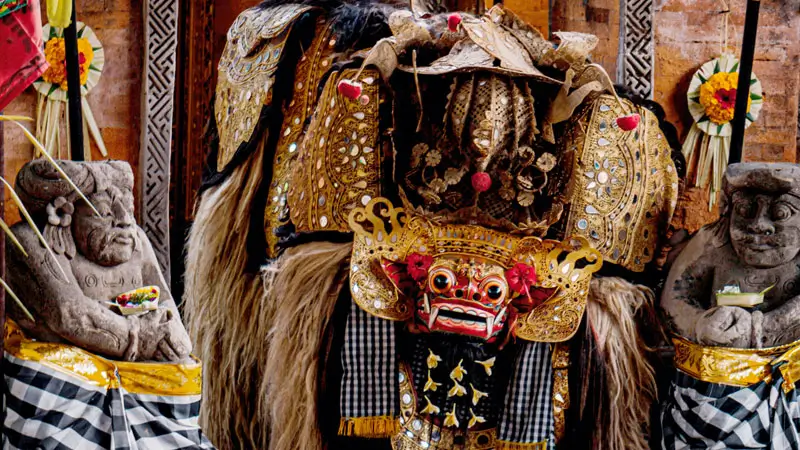
Ubud combines cultural richness, serene landscapes, and vibrant arts, creating a peaceful and authentic experience for visitors. For first-time travelers, Ubud’s unique blend of art, culture, and tranquility is a perfect introduction to Bali’s rich heritage.
Top Highlights in the Ubud Travel Guide for New Travelers
In Ubud, you’ll experience standout attractions that showcase both its heritage and natural beauty:
- Artistic Heritage: Traditional dance performances and vibrant art markets offer a look into Ubud’s rich arts scene.
- Stunning Landscapes: Iconic terraced rice fields, jungle valleys, and serene rivers create a paradise for nature lovers.
- Cultural Depth: Engage with Balinese culture at temples, ceremonies, and rituals.
Preparing for Your Ubud Trip: What Every Visitor Should Expect

In Ubud, a balance of relaxation and cultural discovery awaits. Here’s what you need to know for an enriching experience.
Ubud Travel Guide: Embracing the Local Pace and Cultural Retreats
- Ubud’s slower pace is perfect for relaxed exploration. For etiquette tips, see Balinese Culture and Etiquette for Visitors.
- Explore popular sites like the Sacred Monkey Forest, but for a quieter experience, consider a peaceful village walk or a dance show.
For more itinerary ideas, check out these guides on Ubud Travel Itinerary for First-Timers.
Essential Ubud Travel Guide for a Smooth Adventure

Choosing the Best Season for Ubud’s Attractions
Best Time to Visit Ubud: Discover the Ideal Season for Your Perfect Bali Adventure
Choosing the right season helps maximize your Ubud experience. While the dry season (April – September) draws more crowds with ideal weather for outdoor adventures, the rainy season (October – March) offers lush landscapes and fewer visitors.
- The Dry Season (April – September) is perfect for outdoor activities such as rafting at the Ayung River, hiking, and exploring Ubud’s rice terraces. This season is also popular for festivals and cultural events.
- During the rainy season (October – March), you can enjoy a quieter experience with vibrant landscapes. Museums and wellness centers are great places to visit on rainy days.
Visit during shoulder months like April or September for fewer crowds and favorable weather. For more tips on timing your visit, see our Seasonal Guide to Bali.
Balinese Culture and Etiquette Tips for Visitors
Must-Know Balinese Etiquette: Simple Tips to Show Respect and Blend In
Above all, respecting Balinese customs enhances your visit:
- Dress modestly in temples, covering shoulders and knees.
- Seek consent before taking photos of locals.
- Be mindful of religious ceremonies and avoid disturbing them.
For more, refer to our Responsible Tourism and Cultural Sensitivity in Ubud section.
Navigating Ubud: Transportation Tips from the Ubud Travel Guide
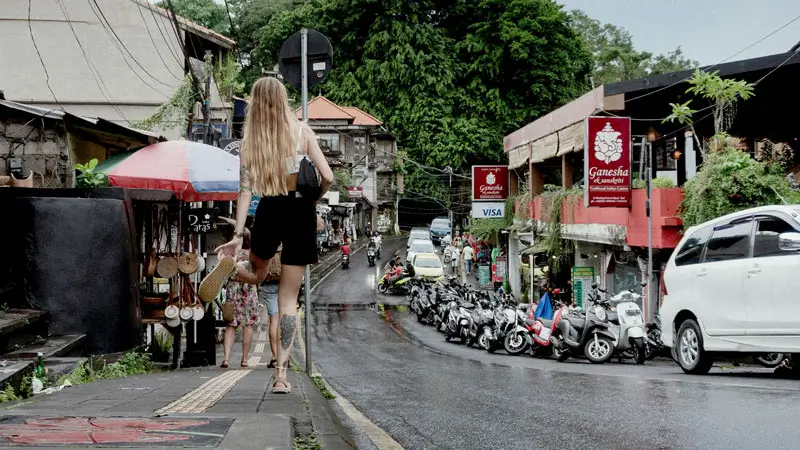
Getting around Ubud is straightforward, with transportation options to fit various budgets and preferences:
Scooter Rentals
Ideal for independent travelers wanting flexibility. Read more on Scooter Rentals Guide.
Private Drivers
Great for comfort and local expertise, especially for groups. Learn more in our Private Driver Guide.
Walking
The best way to explore Ubud’s charm on foot is to discover hidden cafes and markets. Start early to avoid the midday heat, bring water, and wear sturdy footwear for uneven paths.
Additional Options for Getting Around
- Bicycle Rentals: Perfect for cycling enthusiasts; be cautious of traffic.
- Taxis & Ride-Hailing: Grab and Gojek are available, though fares and availability can vary.
For further details, you can explore more on other transportation methods.
Ubud Travel Guide: Essential Packing Tips for Bali’s Unique Climate
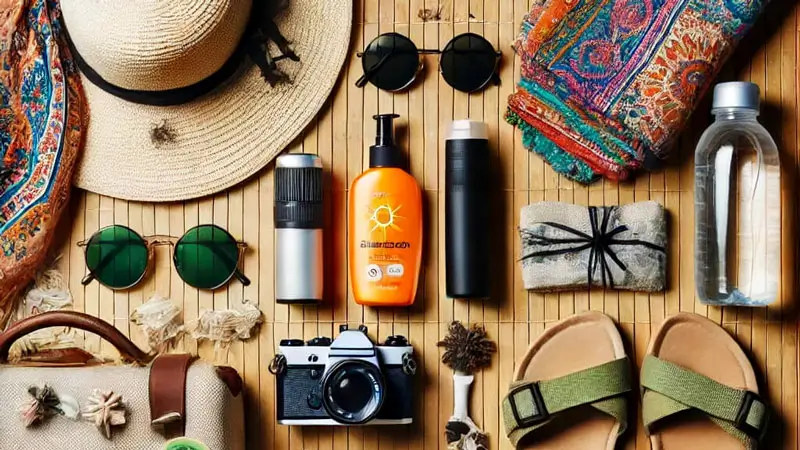
Thoughtful packing will make your Ubud visit more comfortable and enjoyable. Here are the essentials:
Must-Have Items for a Comfortable Visit
Packing Essentials for Ubud: Don’t Forget These Must-Have Items for Comfort and Style
- Sarong: Bring one for sun protection and temple visits—local markets offer beautiful, affordable options.
- Comfortable Shoes: Lightweight sneakers or hiking sandals work well for town, rice terraces, and jungle trails. Tip: Waterproof shoes are handy during the rainy season.
- Sun Protection: To protect yourself from Bali’s sun, pack reef-safe sunscreen, a wide-brimmed hat, and UV-protected sunglasses.
- Cooling Gear: A portable fan or cooling towel helps with Ubud’s midday heat.
For more outfit ideas, see our guide on Getting Ready for Bali: Fun Outfits for Every Adventure.
Ubud Travel Guide: Budget-Friendly Tips to Maximize Your Experience

Planning your Ubud trip on a budget? Here are practical tips to help you save while enjoying Ubud’s best experiences.
Daily Costs for Food, Activities, and Entrance Fees
Wondering How Much to Budget Daily in Ubud? See Typical Costs for Food, Activities & More
To budget effectively, here’s a quick guide to typical costs:
- Food: IDR 40,000–60,000 per meal at local eateries; mid-range dining costs around IDR 80,000–150,000.
- Activities: Dance performances cost approximately IDR 100,000.
- Entry Fees: Sacred Monkey Forest (IDR 80,000), Tegalalang Rice Terraces (IDR 10,000–30,000), Goa Gajah (IDR 50,000).
Pro Tip: A daily budget of IDR 250,000–400,000 per person comfortably covers meals, entry fees, and some activities. For more detailed cost breakdowns, visit the Ubud Budgeting Guide.
Where to Find Local Deals and Affordable Options in Ubud
Looking for Ubud’s Best Deals? Discover Budget Eats, Free Attractions & Local Bargains
From affordable eateries to free attractions, Ubud offers plenty of budget-friendly options:
- Local Markets: Shop for souvenirs at the Ubud Art Market and practice your bargaining skills.
- Affordable Eats: Enjoy Balinese dishes at budget-friendly spots like Warung Babi Guling Ibu Oka or scenic meals at Sari Organik.
- Free Attractions: Walk along Campuhan Ridge or visit the serene Pura Taman Saraswati temple.
Pro Tip: Many restaurants offer discounted lunch spec
Bargaining Tips for Shopping in Ubud
Want the Best Deals? Essential Bargaining Tips for Shopping in Ubud
Maximize your savings with these quick bargaining tips:
- Start negotiations 30–40% below the asking price.
- Maintain a friendly tone to improve the chances of a good deal.
- Use cash for potential extra discounts.
- Compare prices across vendors, as rates can vary.
Must-See Ubud Attractions and Hidden Gems

For a well-rounded experience in Ubud, explore both iconic sites and hidden gems that showcase a unique blend of culture, nature, and tranquility.
Famous Spots in Ubud You Can’t-Miss
Must-See Ubud Landmarks: Discover the Iconic Spots You Can’t Miss!
- Sacred Monkey Forest Sanctuary: Home to over 1,200 macaques and ancient temples, this lush sanctuary is a must-visit. Arrive early (around 9:00 AM) to avoid crowds and catch the monkeys at their most active. Keep belongings secure.
- Tegalalang Rice Terraces: These iconic terraces are perfect for peaceful walks and scenic photography. Visit at sunrise or after 4:00 PM for cooler temperatures and fewer visitors.
- Goa Gajah (Elephant Cave): This historic site features intricate stone carvings and a famous elephant-faced cave entrance. Late afternoons are less crowded. A sarong is required (available at the entrance).
Explore more cultural sites in our Top 10 Ubud Attractions Guide.
Secret Places in Ubud for a Unique Experience
Hidden Gems of Ubud: Discover the Secret Spots for a Truly Unique Experience!
Discover these peaceful, lesser-known spots for a unique experience:
- Gunung Kawi Sebatu Temple: With its tranquil water features, koi ponds, and lush gardens, this water temple is ideal for peaceful reflection. For a more serene experience, visit mid-morning when crowds are fewer.
- Penglipuran Village: Known for its preserved architecture and cultural heritage, this traditional Balinese village is among the world’s most pristine. Mornings are best for exploring bamboo houses and local shops. Respect private spaces.
Altogether, these renowned sites and hidden gems reveal Ubud’s rich culture and beauty, making it a memorable destination for first-time visitors.
Where to Eat in Ubud: Top Dining Spots for Every Taste
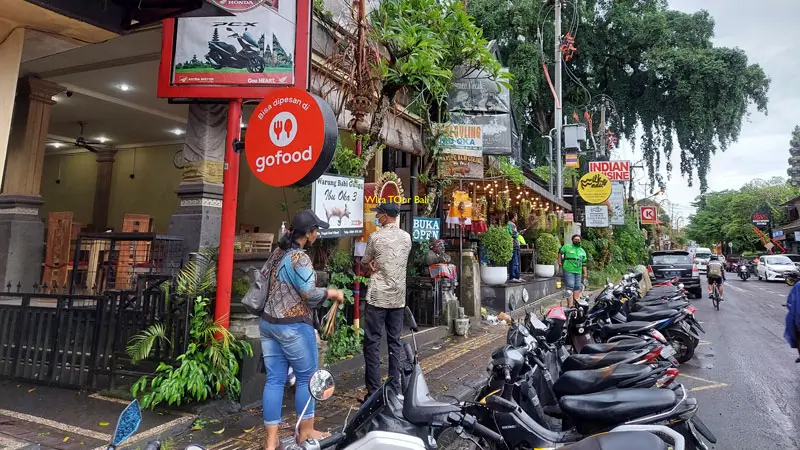
Ubud’s food scene offers a vibrant mix of traditional Balinese flavors and innovative vegan dishes. Here are the top spots to satisfy every palate:
Local Balinese Favorites and Signature Dishes
Must-Try Balinese Dishes in Ubud: Discover Authentic Flavors and Hidden Gems
- Warung Babi Guling Ibu Oka: Famous for its signature Babi Guling (Balinese roast pork), this bustling eatery near Ubud Palace is a must-visit if you’re seeking an authentic Bali experience.
- Sari Organik: Nestled among lush rice paddies, Sari Organik serves organic Balinese and Indonesian dishes. For a true taste of local flavors, try the Nasi Campur. Moreover, the scenic 15-minute walk through the fields makes dining here truly memorable.
Best Vegan and Vegetarian Options in Ubud
Top Vegan and Vegetarian Spots in Ubud: Where Flavor Meets Wellness
- Alchemy: A plant-based haven offering raw vegan dishes like smoothie bowls, salads, and desserts. Alchemy also has a wellness shop for health-conscious treats.
- Zest Ubud: Known for creative vegan fare such as jackfruit rendang, Zest offers a warm, communal atmosphere in a stunning bamboo setting—perfect for an evening with friends.
Explore more dining options in:
- Top Places to Eat in Ubud
- Ubud’s Best Vegan and Vegetarian Restaurants,
- Traditional Balinese Cuisine Guide.
Avoiding Common Mistakes in Ubud: Essential Safety Tips for Tourists
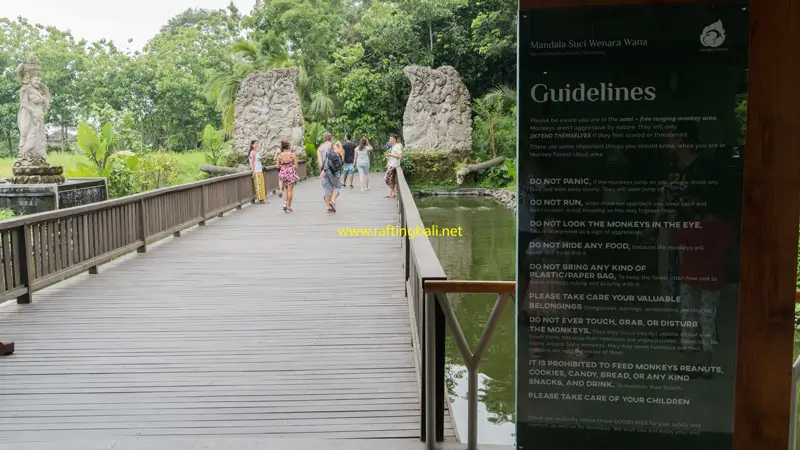
While Ubud is generally safe, being aware of common challenges can ensure a smoother, worry-free experience. Here are key safety tips grouped by theme for easy reference:
Essential Money Tips: Avoid Scams and Make the Most of Your Budget in Ubud
Tourist Scams: Book tours through reputable agencies or your hotel to avoid inflated prices. Use official money changers or ATMs, and always count your cash to prevent shortchanging.
Monkey Safety Tips: How to Stay Safe in Ubud’s Sacred Monkey Forest
Sacred Monkey Forest: Avoid direct eye contact with monkeys, secure your belongings, and do not feed or touch them to prevent aggressive behavior. Ubud Monkey Forest Guidelines
Beat the Crowds: Best Times to Visit Ubud’s Popular Sites
Peak Times: To avoid crowds at popular sites like Tegalalang Rice Terraces, visit early (around 8–9 AM) or late in the afternoon (4–5 PM).
Stay Safe Dining in Ubud: Essential Food and Water Tips
- Water: Drink bottled or purified water, and verify whether ice is safe when dining out. A refillable water bottle is great for staying hydrated and reducing plastic waste.
- Food: Choose cooked food, especially in street food settings, and opt for well-reviewed restaurants. Recommended spots include Locavore (creative Balinese cuisine), Warung Sopa (vegetarian-friendly), and Kafe Ubud (organic choices).
Explore More: Eating Safely in Bali.
Ubud Travel Guide to Health and Wellness for Travelers
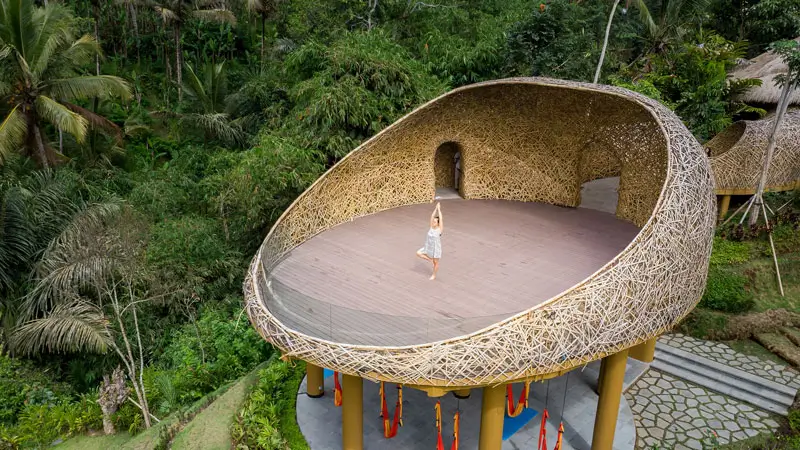
Ubud’s wellness scene, with its renowned spas and yoga studios, makes it a top choice for health-conscious travelers. Here are the top places to rejuvenate and unwind:
Top Yoga Studios and Spas in Ubud for Relaxation
Ubud offers a range of rejuvenating options for yoga and spa enthusiasts:
Discover Ubud’s Most Relaxing Yoga Studios and Tranquil Spas – Find Your Perfect Retreat
Top Spas
- Taksu Spa: A jungle retreat known for traditional Balinese massages.
- Karsa Spa: Offers calming massages with scenic rice field views.
- Cantika Zest: Focuses on Balinese-inspired treatments using natural skincare.
Explore Ubud’s Most Popular Yoga Studios – Classes, Community, and Scenic Spaces Await!
Popular Yoga Studios
- Yoga Barn: Offers classes for all levels, along with wellness workshops.
- Radiantly Alive: Known for yoga, Pilates, and community events.
- Ubud Yoga House: A peaceful studio with small, mindful classes in a scenic setting.
Pro Tip: Many wellness centers offer discounts for package bookings or multiple sessions. Pre-booking is recommended, especially during peak hours.
Explore More:
Responsible Tourism and Cultural Sensitivity in Ubud

Ubud’s rich culture and natural beauty are best enjoyed through responsible and respectful practices. Here’s how to make a positive impact during your visit:
How to Practice Responsible Tourism and Show Cultural Respect in Ubud
- Support Local Artisans: When shopping for souvenirs, purchase handmade items directly from artisans at the Ubud Art Market. This way, you support Balinese craftsmanship and contribute to the local economy.
- Respect Local Customs: Request consent before photographing locals, especially during religious ceremonies. Dress modestly in temples, covering shoulders and knees; many temples offer sarongs if needed. A friendly smile and nod go a long way.
- Eco-Friendly Practices: To help reduce waste, carry a reusable water bottle and shopping bag, as Bali has strict rules on single-use plastics.
Pro Tip: Simple gestures like polite bargaining, a friendly nod, and reducing waste can enhance your experience and positively impact Ubud’s community.
Explore More:
Ubud Travel Guide: Responsible Tourism and Cultural Sensitivity
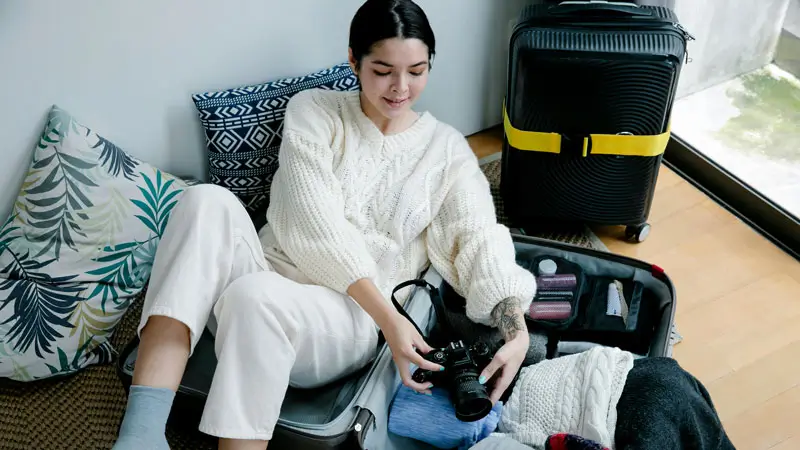
These practical tips will help make your time in Ubud hassle-free:
Essential Tips for a Hassle-Free Ubud Adventure: Currency, Safety, and More
- Currency Tips: Cash is commonly used, especially in markets and smaller dining spots. To make transactions smoother, carry small bills (IDR 10,000–50,000) for convenience. Additionally, use official currency exchange counters or bank ATMs—it’s best to avoid street booths, which may be less reliable.
- ATM Safety: ATMs are available throughout central Ubud. For security, use ATMs within banks or trusted stores, and avoid carrying large amounts of cash.
- Tour Operators: When booking excursions, choose eco-friendly tours through reputable operators with positive reviews, which hotels often recommend.
- Healthcare Options: For minor medical needs, you can visit local clinics such as the Ubud Clinic and Toya Medika Clinic. Travel insurance that covers medical expenses is highly recommended.
Explore more in the Bali Travel Guide for Practical Tips.
Conclusion: Your Smooth Ubud Adventure Awaits
Ubud’s rich blend of culture, nature, and warmth awaits you. Save this guide for easy reference and use it to plan memorable experiences in Bali’s cultural heart. Ready to start your Ubud adventure?
Bahasa Indonesia:

 How Much Does a Honeymoon in Bali Cost? A Full Budget Breakdown
How Much Does a Honeymoon in Bali Cost? A Full Budget Breakdown
We'd love to hear from you! Share your thoughts or experiences in the comments below!